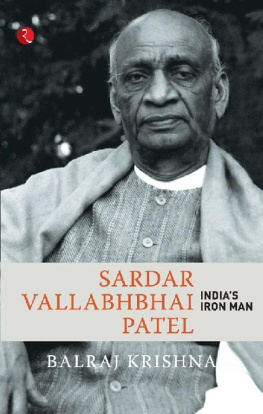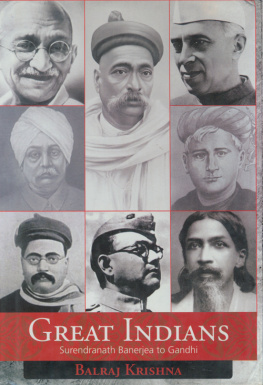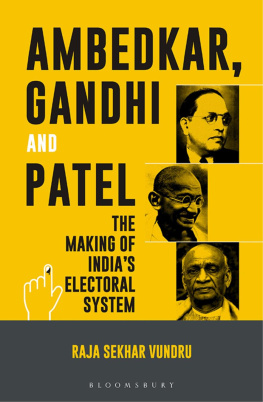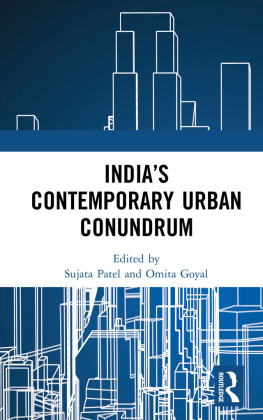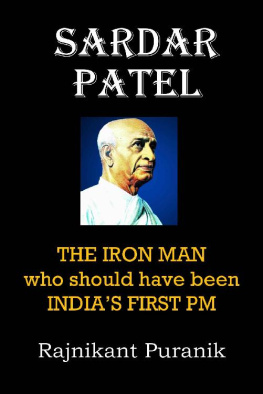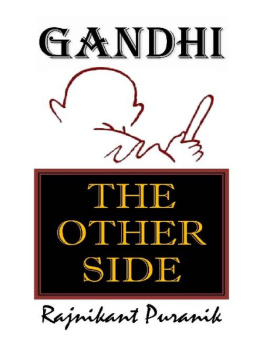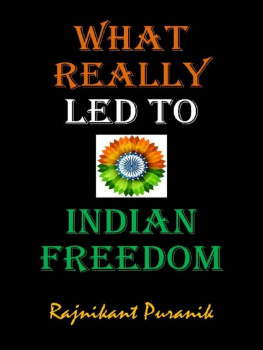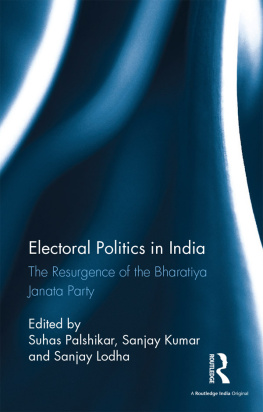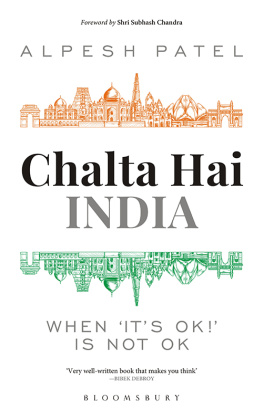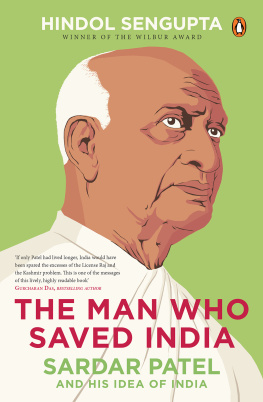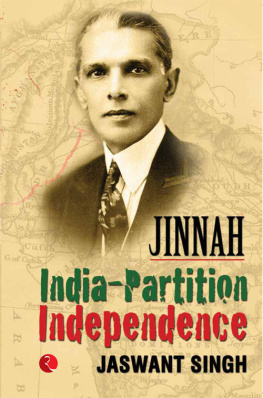Sardar Vallabhbhai Patel
Sardar Vallabhbhai Patel
INDIAS IRON MAN
Balraj Krishna

Copyright Balraj Krishna 2005
First published in 2005 by
Rupa Publications India Pvt. Ltd.
7/16, Ansari Road, Daryaganj,
New Delhi 110 002
All rights reserved.
10 9 8 7
No part of this publication may be reproduced, stored in a retrieval system, or transmitted, in any form or by any means, electronic, mechanical, photocopying, recording or otherwise, without the prior permission of the publishers.
Balraj Krishna asserts the moral right to be identified as the author of this work.
To my father Gauri Shankar
1885-1975
A nationalist to the core, at 19 in 1904 he joined Lala Lajpat Rais volunteer corps and served in Kangra earthquake relief; in 1905, he boycotted foreign cloth for good, in answer to the call of the Bengal Partition leaders; and in 1921, he responded to Gandhis call to give up imported sugar, and he stuck to his decision till indigenous production started a decade and a half later. He was my inspirer and financial support when I devoted myself to Sardar Patels biography. He had in him the spirit of the times, having been born in the year the Indian National Congress was established (1885). He was considerably influenced by the militant nationalism of Tilak, Lajpat Rai and Bipin Chandra Pal. He was a close friend of revolutionary Bhagat Singhs father, Sardar Kishen Singh. A neo-Hindu of Swami Dayanands Arya Samaj, he adhered to resurgent Hinduism, and discarded caste to contribute to Hindu unity. Later, he developed great affinity for Sardar Patel. He desired I should write this biography, which is in fulfillment of his wish.
Contents
Acknowledgements
I was privileged to receive, either through interviews or through correspondence, personal memoirs from many, which helped me build up Sardar Patels image as the Iron Man of India: bold, blunt and shrewd; principled and uncompromising on national matters; to a degree ruthless in the face of a crisis, otherwise benign, even persuasive when that served purpose. Some of my contributors were British; the rest were Indians. Among the former were Lord Mountbatten, General Sir Roy Bucher, Air Marshal Sir Thomas Elmhirst, Sir Hugh Garrett (an old ICS), Andrew Mellor, the Daily Herald correspondent, and C.W.E. Uren, the British Indian Police officer who served an arrest warrant on Patel in the pre-dawn swoop on August 9th, 1942. Quit India was his guilt.
There were nearly a dozen members of the ICS, the implementers of the transfer of power, who generously offered me their help. They included such distinguished members of the Service: C.S. Venkatachar, H.V.R. Iengar, K.B. Lall, Vishnu Sahay, C.D. Deshmukh, C.M. Trivedi, H.M. Patel, K.P.S. Menon, Shavax Lal, N. Senapati, B.R. Patel and the redoubtable V.P. Menon, Patels right-hand man in the elimination of the Princely Order.
I was a recipient of similar generosity from elderly veteran Indulal Yagnik, Bardoli warhorse Kalyanji Mehta, Ashabhai Patel of Ras, K.M. Munshi, M.R. Masani, Lalji Mehrotra, Mahavir Tyagi, Thakur Jaswant Singh (of Bikaner), Mehr Chand Khanna, Bhim Sen Sachar, S. Ramakrishnan (Bharatiya Vidya Bhavan), Begum Aizaz Rasul (UP Muslim Leaguer), G.M. Sadiq, Humayun Kabir, Nityanand Kanungo and Khushwant Singh.
To each one of them I offer my deepest gratitude for helping me make this biography of Sardar Patel what it has turned out to be.
Balraj Krishna
181, Mehr Naz, Cuffe Parade,
Mumbai 400 005
Preface
Common talk among the members of the Indian Civil Service post-Independence used to be: If the dead body of the Sardar were stuffed and placed on a chair, he could still rule. Patels hold over the party was absolute. He had been the builder of the party machine; he was, hence, the master of party affairs. None could challenge his authority, or do so at his cost. Eight months before his death, Lord Mountbatten pleaded with him for Nehru: With your support Jawaharlal cannot fail
Patel judged people instantly. He had the courage to reprimand the erring. He did so judiciously, though treating everyone with the same yardstick. There were two exceptions: Gandhi and Nehru. He spared them with a difference. To Gandhi, he was respectful as his guru; to Nehru, considerate as his Prime Minister. In national matters he was harder than steel, but softer than a flower in personal and private relations.
Patel never walked over a fallen enemy. Post-Independence when he wielded power, this was particularly so in the case of the Princes who had surrendered to him on losing their battles. They included such powerful ones as the Nawab of Bhopal who had intrigued on behalf of Jinnah to dismember India; the Nizam of Hyderabad who waged a war of independence at Jinnahs behest; and C.P. Ramaswami Aiyar, Diwan of Travancore, who was the first to raise the banner of revolt by declaring that Travancore would be independent simultaneously with the lapse of Paramountcy. The Jamsaheb of Nawanagar had earlier played into the hands of Sir Conard Corfield, the powerful Secretary of the Political Department, in the latters proposed formation of an independent confederation of the Kathiawar States outside the proposed Indian Union. Many considered it a miracle when a single meeting with Patel turned him into an ardent supporter of the Sardars plan to unify these States as a unit of the Indian Republic.
There was a glaring contrast between the attitudes of Nehru and Patel towards the Princes. One instance in particular may be mentioned. Nehru felt annoyed over the Jamsahebs membership of the Indian delegation to the UN General Assembly in 1949, and blurted, I am damned if I send him on our delegation. He and his diamond buttons! Foreign Secretary K.P.S. Menon reported Nehrus reaction to Patel who kept quiet for a few seconds and said, I have given my nomination and I stick to it. Panditji accepted the nomination without further ado.
Patels helping hand reached high and low alike. The Nawab of Bhopals son-in-law, the Nawab of Pataudi, along with his family, was trapped in communal rioting in his state capital. Patel responded to Bhopals appeal by sending an emissary in his car to get the news and render whatever help was needed. I too was a recipient of Patels large-heartedness. Lahore was in the grip of communal holocaust. My younger brother, Yuvraj Krishan, was to sit for the first competitive examination of the newly-formed IAS replacing the ICS, being held in July 1947. In May I had forewarned the British Chairman of the Federal Public Service Commission (later UPSC), of the grave communal situation prevailing in Lahore. I got a shock in early June when communication reaching us stated that the centre for the candidates would be the Islamia College, which was located in an area under 72-hour curfew. What could be done at that late stage? I wondered. All the leaders were neck-deep in the transfer of power. My instinct forced me to write to Patel, even when I was uncertain if he could spare a few minutes. I had a most pleasant surprise on the third or fourth day, when a telegram from Patels office informed me of the change of the centre to a safer locality. Further, each candidate was asked telegraphically whether he would take the examination at Lahore or Simla.
I was instantly won over. I said to myself: Heres a man of action, caring as much for the common folk as for better placed. Pre-Independence, we, the young in Lahore and elsewhere, did not pay much attention to Patel. The charisma of Gandhi, Nehru and Subhas cast a spell on us. We revered Gandhi as a Mahatma; we admired Subhas Chandra Bose as a radical; but we loved Nehru as our uncrowned king. We even sought identification with Nehru by donning the Jawahar jacket in a spirit of national pride. Patels one act considerably enhanced my esteem for him. He gained such esteem from the people in the Punjab and the NWFP during the months which followed Partition. He was one man who saved the lives of millions stranded in West Pakistan by arranging their expeditious pull-out.
Next page
